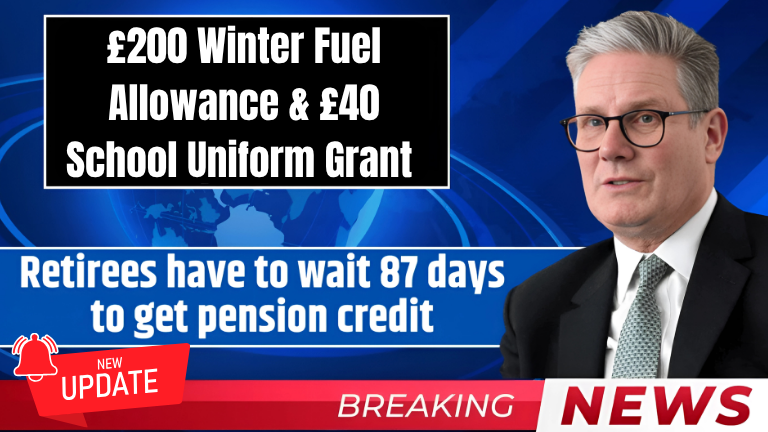The landscape of financial support for Britain’s elderly population has undergone dramatic transformation in recent months. State pensioners across the UK are navigating significant changes to their winter financial assistance, particularly regarding the controversial £200 Winter Fuel Payment.
The government’s decision to restrict this vital support has created both confusion and concern among millions of pensioner households. Understanding these changes is crucial for anyone approaching or currently receiving their state pension.
Understanding the £200 Winter Fuel Payment Changes
What is the Winter Fuel Payment?
The Winter Fuel Payment represents a cornerstone of government support designed to help older people manage their heating costs during harsh winter months. This tax-free annual payment traditionally provided financial breathing room when energy bills peaked.
The payment amounts to either £200 or £300 depending on the recipient’s age and circumstances. Those under 80 years old receive £200, while households with someone aged 80 or over qualify for the higher £300 payment.
Revolutionary Changes in Eligibility Criteria
The most significant transformation occurred on 29 July 2024, when Chancellor Rachel Reeves announced that Winter Fuel Payments would become means-tested. This decision fundamentally altered who qualifies for this essential support.
Previously, all pensioners over state pension age automatically received these payments. The universal nature meant approximately 10.8 million pensioners in 7.6 million households across England and Wales benefited from this support.
Current Eligibility Requirements for £200 Payments
Who Qualifies Now?
To receive a Winter Fuel Payment for 2024-2025, you must have been born before 23 September 1958 and live in England, Wales, or Northern Ireland. However, the crucial additional requirement is receiving specific qualifying benefits.
Essential qualifying benefits include:
- Pension Credit
- Universal Credit
- Income Support
- Income-based Jobseeker’s Allowance
- Income-related Employment and Support Allowance
Following these changes, only approximately 1.5 million individuals in 1.3 million households in England and Wales now receive payments. This represents a dramatic reduction from previous years.
The Qualifying Week Importance
You must have been receiving a qualifying benefit during the specific qualifying week of 16 to 22 September 2024. This timing requirement determines your eligibility for the entire winter period.
Payment Amounts and Distribution
How Much Will You Receive?
The amount you receive depends on your age and circumstances during the qualifying week. Payment calculations remain straightforward:
Standard rates:
- £200 for households where the oldest person is under 80
- £300 for households with someone aged 80 or over
All Winter Fuel Payment money is tax-free and will not affect your other benefits. This protection ensures the support doesn’t inadvertently reduce other essential assistance.
Payment Timeline and Methods
Most eligible people receive their payments in November or December. The government sends notification letters in October or November to confirm your payment amount.
Payments go directly into the bank account where your benefits are usually deposited. This automated system reduces administrative burden and ensures swift delivery.
Regional Variations and Special Circumstances
Scotland’s Alternative Approach
Scotland is developing its own Pension Age Winter Heating Payment to replace the Winter Fuel Payment. Initially, this new benefit maintained similar eligibility restrictions as the UK government’s changes.
For 2024, Scottish payments are handled by the Department for Work and Pensions, but from 2025, Social Security Scotland takes responsibility.
Northern Ireland’s Additional Support
Northern Ireland has announced a one-off £100 payment for pensioners affected by Winter Fuel Payment changes. This additional support recognizes the impact of reduced eligibility.
Approximately 250,000 pensioners in around 170,000 households will receive this automatic payment before March 2025. No application is required for this supplementary support.
Pension Credit: The Gateway to Support
Why Pension Credit Matters
Pension Credit has become the primary gateway to accessing Winter Fuel Payments and numerous other benefits. This means-tested benefit tops up income for those over state pension age who are struggling financially.
The government recognizes that many eligible pensioners don’t claim Pension Credit. A major awareness drive encouraged applications by 21 December 2024, allowing backdated payments and Winter Fuel Payment qualification.
Additional Benefits Through Pension Credit
Pension Credit unlocks access to various support schemes:
- Free NHS dental treatment
- Free eye tests and glasses
- Free TV licence for those aged 75 and over
- Warm Home Discount Scheme
- Help with housing costs
State Pension Increases and Triple Lock
Significant Pension Rises
Millions of pensioners receive up to £470 more annually in their State Pension from April 2025, thanks to the government’s triple lock commitment. This substantial increase provides some compensation for reduced Winter Fuel Payment eligibility.
The triple lock means State Pension increases by the highest of inflation, average earnings growth, or 2.5%. For 2025-26, this resulted in a 4.1% increase.
Actual Payment Amounts
The new State Pension rises to £230.25 per week (up from £221.20), while the basic State Pension increases to £176.45 per week (up from £169.50).
These increases represent some of the largest cash improvements to State Pension payments in recent history. The government emphasizes this demonstrates continued commitment to supporting pensioner incomes.
Impact and Government Response
Financial Implications
The Winter Fuel Payment changes are expected to save approximately £1.3 billion in 2024-25 and £1.5 billion in subsequent years. These savings form part of broader government efforts to address public spending pressures.
The government argues that restricting payments to those most in need ensures support reaches pensioner households on the lowest incomes. However, critics highlight the potential hardship for those just above benefit thresholds.
Supporting Vulnerable Pensioners
The government has committed to working with older people’s charities and local authorities to identify eligible households not claiming Pension Credit. This outreach aims to maximize uptake among those entitled to support.
Housing element introduction in Pension Credit is planned for 2026, replacing Housing Benefit for people above State Pension age. This change should simplify the benefits system for older people.
What You Need to Do Now
Check Your Eligibility
If you’re over state pension age and struggling with heating costs, investigate whether you qualify for Pension Credit. Many people entitled to this support don’t realize they’re eligible.
Contact the Pension Credit helpline on 0800 99 1234 for guidance. Online applications are also available through the official government website.
Understand Your Rights
If you believe you’re eligible but haven’t received a Winter Fuel Payment notification letter by November, check whether you need to make a claim. Don’t assume you’re automatically excluded.
Review your benefit entitlements regularly, as changes in circumstances might affect your eligibility for various support schemes.
Long-term Changes
The shift toward means-tested Winter Fuel Payments represents a fundamental change in government support philosophy. Rather than universal benefits, support increasingly targets those with the greatest financial need.
State Pension increases through the triple lock provide some compensation, but individual circumstances vary significantly. Planning becomes more important as benefit eligibility becomes more complex.
Preparing for Winter Costs
With reduced Winter Fuel Payment eligibility, many pensioner households must find alternative ways to manage heating costs. Energy efficiency improvements, switching suppliers, and accessing local authority support schemes become increasingly important.
Consider budgeting strategies that spread energy costs throughout the year rather than facing large winter bills. Direct debit arrangements with energy suppliers often provide more predictable monthly payments.
Short FAQs
Q: Who can still get the £200 Winter Fuel Payment?
People born before 23 September 1958 who receive Pension Credit or certain other means-tested benefits.
Q: When will I receive my Winter Fuel Payment?
Most eligible people receive payments automatically in November or December.
Q: Do I need to apply for the Winter Fuel Payment?
No application needed if you already receive qualifying benefits – payments are automatic.
Q: What if I think I’m eligible but haven’t heard anything?
Contact the Winter Fuel Payment Centre if you haven’t received a notification letter by November.
Q: How much will I get?
£200 if you’re under 80, or £300 if you or your partner are 80 or over.
Q: Is the Winter Fuel Payment taxable?
No, Winter Fuel Payments are completely tax-free and don’t affect other benefits.
Q: What’s happening in Scotland?
Scotland is introducing its own Pension Age Winter Heating Payment with similar eligibility rules.
Q: Can I still get help with heating costs if I don’t qualify?
Yes, check eligibility for Pension Credit and contact your local authority about additional support schemes.
Q: When do the new rules start?
The means-testing rules began for winter 2024-2025 and continue for future years.
Q: What should I do if my payment is late?
Contact the Winter Fuel Payment Centre if you haven’t received payment by 29 January 2025.

